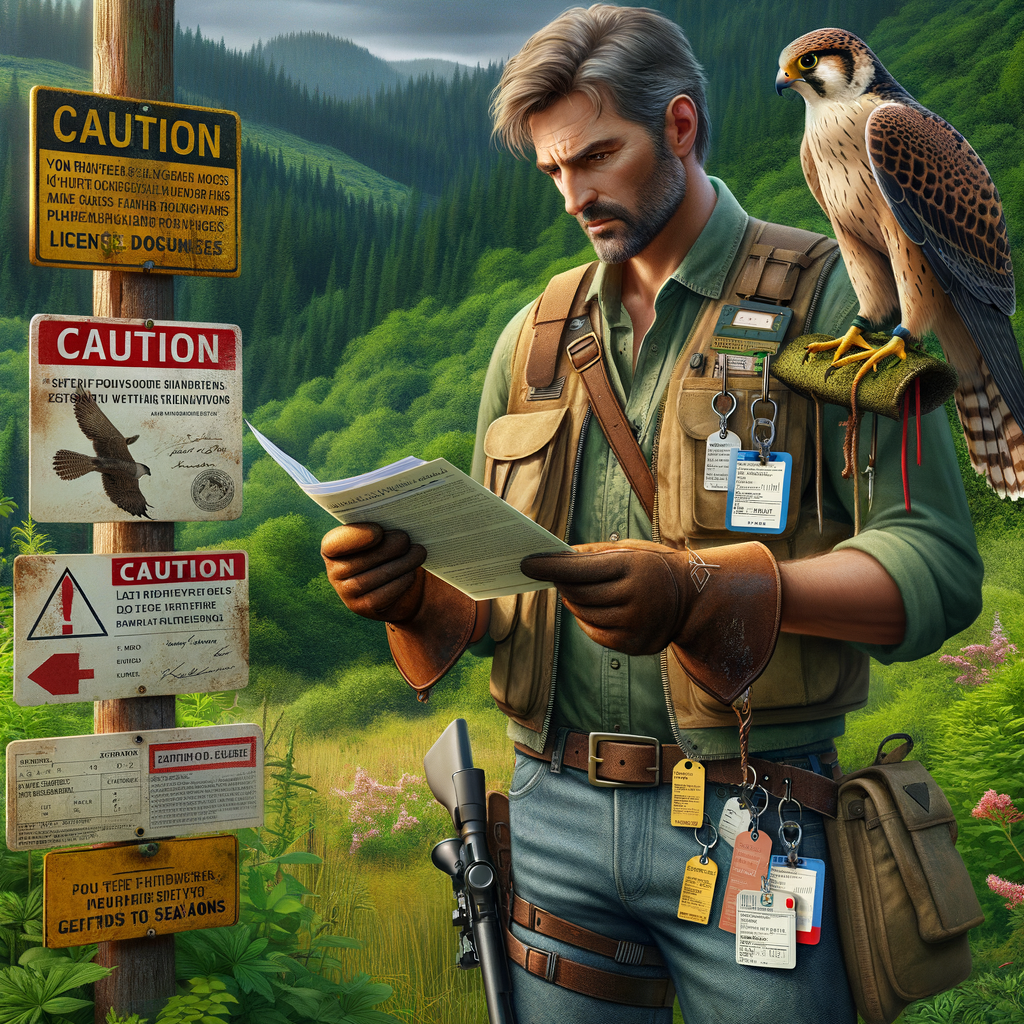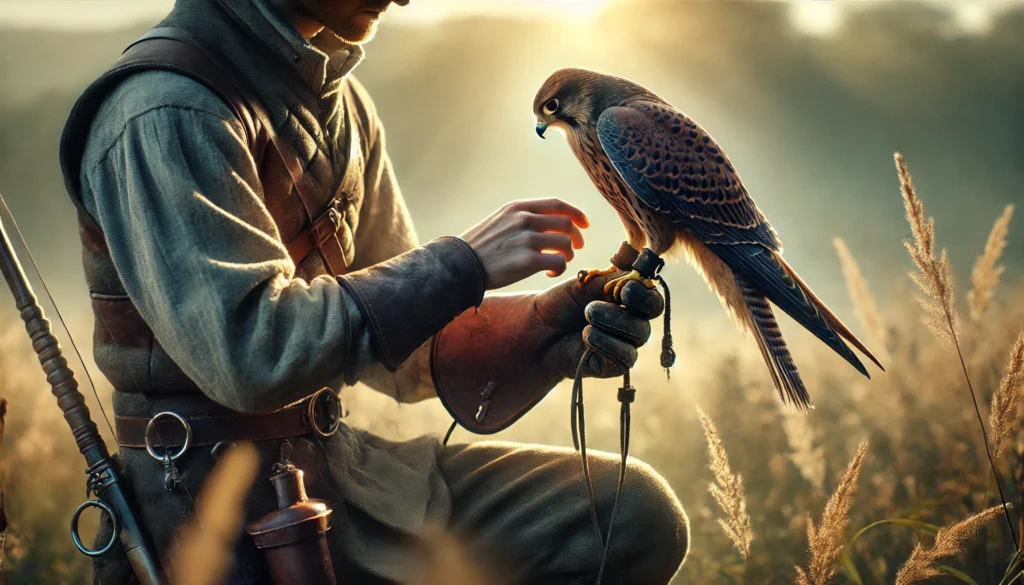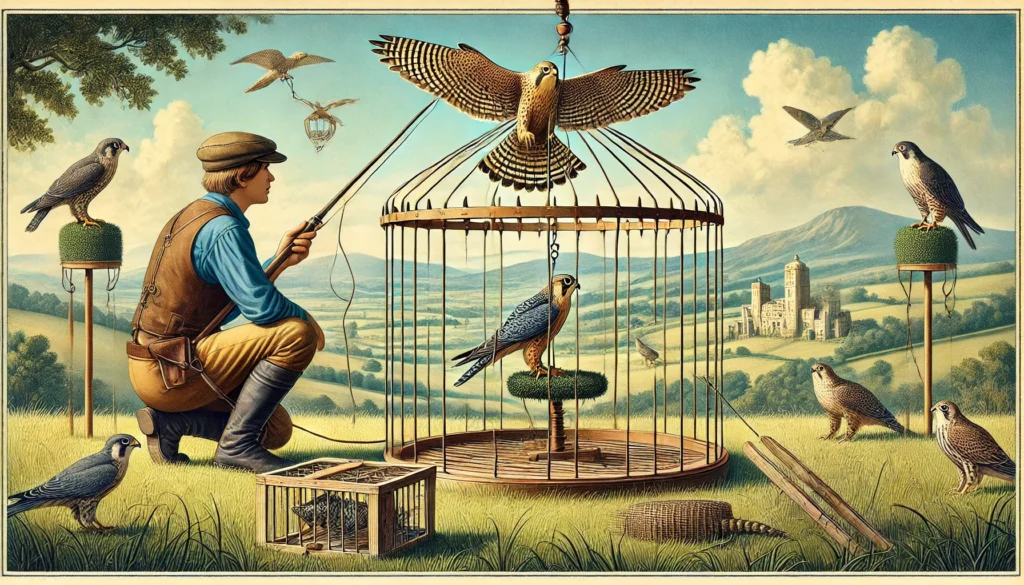Important Falconry Hunting Regulations
- Licensing Requirements: Make sure you have the proper falconry license before hunting.
- Hunting Seasons: Follow the specific hunting seasons for different bird species.
- Permitted Species: Know which birds of prey are allowed for falconry.
- Bag Limits: Understand the daily and seasonal limits for capturing game.
- Authorized Areas: Only hunt in designated areas that allow falconry.
- Protected Species: Be aware of and avoid hunting protected species.
- Equipment Standards: Use only approved falconry equipment.
- Report Harvests: Record and report your hunts as required by law.
Keeping these important points in mind will help you enjoy falconry responsibly and legally!
Falconry Hunting Regulations: Your Path to Responsible Falconry
Hey there, falcon enthusiasts! If you’re reading this, you’re probably as captivated by the majestic art of falconry as we are at Learn Falconry. Imagine for a moment you’re strolling through the lush, green hills of Ireland. You hear a gentle whistle and see a skilled shepherd with his dog, expertly guiding a flock of sheep. That well-coordinated dance isn’t just random’it’s carefully regulated to protect both the sheep and the land. In much the same way, falconry hunting regulations are in place to ensure this ancient sport remains sustainable and respectful to the wildlife and environment.
Why should you keep reading? Well, just as guidelines help maintain the harmony between a shepherd, his dog, and the landscape, understanding falconry regulations is crucial for balancing our passion for hunting with falcons and the well-being of the ecosystems we interact with. By diving into these regulations, you’ll not only gain deeper insights into the sport but also discover how you can contribute to its future’ethically and responsibly. So stick with us, and let’s navigate these guidelines together, ensuring our feathered friends and the natural world are treated with the respect they deserve!
Falconry is a super cool hobby, but did you know you can’t just grab a bird and start hunting? There are specific rules and laws, called falconry hunting laws, that you must follow. These hunting regulations ensure that everyone practices falconry safely and responsibly.
What are Falconry Hunting Laws?
First things first, falconry hunting laws are the rules set by the government to regulate the practice of falconry. These laws vary depending on where you live, and they cover everything from the types of birds you can use to how you need to take care of them.
Falconry Licensing Requirements
To start practicing legal hunting falconry, you need a special license. This isn’t just any license’you must prove your knowledge and skills. This often involves passing a test and working under a sponsor who already has experience in falconry. You can learn more about the requirements on our Falconry Licensing Requirements page.
Protected Species in Falconry
Some species of raptors (hunting birds) are protected by law and can’t be used in falconry. This ensures that rare or endangered birds are not taken from the wild. Knowing which birds are protected helps to follow conservation laws while practicing falconry. For more details, visit our page on Protected Species in Falconry.
Important Hunting Regulations
Federal and State Laws
On top of getting your license, you’ll need to understand both federal and state hunting regulations. Federal laws generally provide the overall framework, while state laws might have their own unique rules. Always check both before heading out for a hunt.
International Regulations
If you’re an adventurous falconer who plans to travel with your bird, international regulations come into play. Different countries have their own set of rules, and you must comply with them to avoid any legal issues. You can explore more on international laws in our section on International Falconry Regulations.
Permits and Applications
To legally hunt with your falcon, you’ll need various permits. Sometimes, these permits have to be renewed annually, and they often require detailed logs or reports about your bird’s activities. Learn more about the necessary permits on our Falconry Permits & Applications page.
Keeping It Legal: Why It Matters
Wildlife Protection
Hunting regulations are not just about paperwork. They help protect wildlife, ensuring that bird populations remain healthy and that habitats are not destroyed. This is why understanding and following legal hunting falconry practices are crucial. Learn about the role of falconry in conservation.
Ethical Hunting Practices
Ethics play a significant role in falconry. Practicing ethical hunting ensures that both the bird and the prey are treated humanely. Discover more on ethical hunting in falconry on our comprehensive guide to Ethical Falconry.
Falconry Equipment
Using the right gear is also part of staying legal. From hoods to gloves, each item has regulations around its use. Check what gear you need in our section on Falconry Equipment.
By following these laws and regulations, you’re making sure that you and your bird can enjoy falconry safely and responsibly.
Falconry Hunting Regulations for 2024
Falconry is a unique type of hunting that involves training birds of prey to hunt wild animals. This practice has been regulated to ensure the protection and conservation of both the raptors and the wildlife they hunt. Below is a friendly and engaging overview of the key regulations for falconry hunting in Pennsylvania for 2024, along with some essential data and examples to help understand these rules better.
Permits
To practice falconry in Pennsylvania, a permit issued by the Pennsylvania Game Commission is required.
- Permit Allocation:
- Permits are distributed based on an annual quota.
- Resident applications are prioritized, and if the quota is not fully utilized, nonresident applications are considered.
Capturing Raptors
Capturing raptors for falconry is regulated to ensure this activity does not negatively impact wild populations.
- Legal Methods:
- Falconers in Pennsylvania can capture raptors using approved devices under § 147.105a(4).
- A maximum of two wild eyases (young raptors) may be taken per year per permit holder, with the stipulation that the last remaining eyas in a nest must not be taken.
Raptor Use
There are specific rules about which raptors can be used for falcons and how many.
- Depredation and Rehabilitation:
- Raptor falconers can use raptors taken under a depredation permit or those rehabilitated but unfit for release back into the wild, with the necessary authorization from the Commission.
- Falconers are limited to taking no more than two raptors from the wild per year for any reason, including replacement.
Seasons
Falconry hunting seasons vary based on the species being hunted. Below is a table of key species and their respective seasons:
| Species | Season Dates |
|---|---|
| Squirrel | September 2, 2024, to November 16, 2024, and December 2, 2024, to March 31, 2025 |
| Bobwhite Quail | Same as Squander season |
| Ruffed Grouse | Same as Squander season |
| Cottontail Rabbit | Same as Squander season |
| Snowshoe or Varying Hares | Same as Squander season |
| Pheasant | Same as Squander season |
| Mink, Muskrat, Fox, etc. | Same as Squander season |
Bag Limits
To ensure sustainability, there are restrictions on the number of animals that can be hunted.
- Daily and Possession Limits:
- Bag limits vary by species, with some having no limit while others might have a daily limit ranging from 1 to 6.
Utah Falconry Regulations
Apart from Pennsylvania, Utah also has specific regulations for 2024:
- Peregrine Falcon Take Application Period:
- Open from February 1, 2024, to March 31, 2024.
- Peregrine Falcon Take Season:
- Open from May 1, 2024, to August 31, 2024.
Federal Migratory Bird Hunting Regulations
The migratory bird hunting regulations are set by the U.S. Fish and Wildlife Service:
- Public Commentary Period:
- Proposed regulations for the 2024-25 season are open for public comment until June 12, 2024.
To illustrate:
| Regulation Area | Key Information |
|---|---|
| Pennsylvania Permits | Priority for residents, limited quota |
| Capture Restrictions | No more than 2 eyases, cannot take the last from the nest |
| Raptor Use | Limited to 2 wild captures per year, includes rehabilitated and depredation-permitted raptors |
| Seasons (Squirrel example) | Sept 2 – Nov 16, 2024, Dec 2, 2024 – March 31, 2025 |
| Utah Peregrine Falcon | Feb 1 – March 31 application, May 1 – Aug 31 take period |
| Migratory Birds | Public comment open until June 12, 2024 |
This comprehensive guide aims to provide a clear understanding of the falconry hunting regulations in Pennsylvania and other specific states for 2024. By following these regulations, falconers contribute to the conservation efforts and ethical practice of this ancient sport.
Wrap-Up of Falconry Hunting Regulations
Understanding the key regulations for falconry hunting in Pennsylvania is crucial for ensuring a responsible and enjoyable experience. Here are the critical points:
- Permits and Quotas: Falconers in Pennsylvania need permits issued by the Pennsylvania Game Commission, which are allocated based on an annual quota. Pennsylvania residents have priority in the drawing process.
- Raptor Capture and Use: Falconers are allowed to capture specific types of raptors, with regulations on the number and method of capture. There are also provisions for the use of raptors obtained through special circumstances.
- Hunting Seasons: The falconry season for species like squirrels, bobwhite quail, ruffed grouse, and several others run from early September to late March, with specific dates outlined each year.
- Bag Limits: Varying limits exist for different species, ensuring sustainable hunting practices.
These rules play a vital role in conserving wildlife and maintaining the natural balance. By adhering to these regulations, falconers contribute to the health and sustainability of raptor populations and their prey, ensuring that falconry remains a respected and ethical practice. Happy hunting, and always remember to respect nature and its laws!



